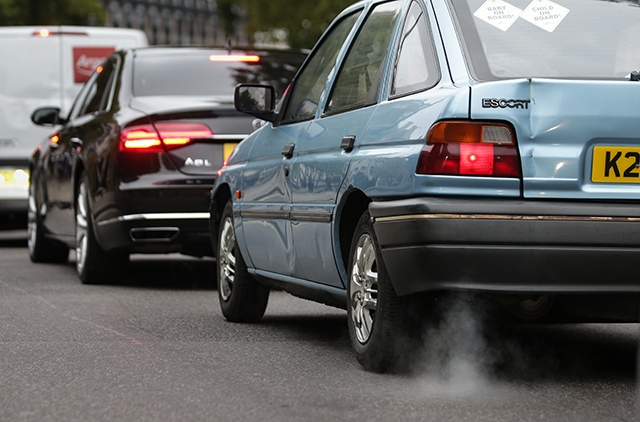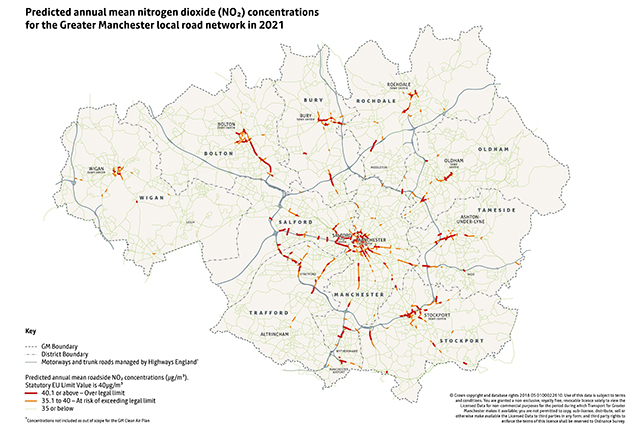Full extent of Greater Manchester’s air quality problem revealed in new report
Date published: 23 October 2018

Poor air quality is the largest environmental public health issue facing the UK
Many more parts of Greater Manchester have higher levels of air pollution than previously thought, a report published today (Wednesday) reveals.
152 stretches of road in Greater Manchester - including some in Oldham - will still be in breach of legal limits for concentrations of harmful nitrogen dioxide (NO2) beyond 2020 unless action is taken.
This new analysis is set out in a report to be considered by Greater Manchester Combined Authority (GMCA) on Friday (October 26) setting out progress on the Greater Manchester Clean Air Plan.
Poor air quality is the largest environmental public health issue facing the UK.
Road transport causes 80% of NO2 emissions at the roadside, mainly from diesel vehicles.
Pollutants are linked to a wide range of serious health problems, reduced life expectancy, and contribute to the equivalent of 1,200 deaths a year in Greater Manchester alone1.
A new Greater Manchester public health campaign and air quality website – www.CleanAirGM.com – will raise awareness of the serious impacts of air pollution and show how residents, businesses and local authorities can work together to tackle it.
The website will also give latest details on the development of the Greater Manchester Clean Air Plan.
Last year the Government’s broad-brush national air pollution model identified just 11 locations in Greater Manchester which are expected to contravene NO2 limits beyond 2020.
Detailed local modelling published today has shown the problem not only to be more widespread but also worse, with higher levels of NO2 than expected.
Greater Manchester is one of dozens of areas in the UK instructed by Government to put forward proposals to tackle NO2 air pollution on local roads as soon as possible2.
All 10 Greater Manchester councils are developing a single Clean Air Plan to reduce NO2 in close collaboration with Public Health England and the Government’s Joint Air Quality Unit (JAQU).
Transport for Greater Manchester (TfGM) is working closely with the 10 councils to produce the draft plan.
Councillor Alex Ganotis, GMCA Green City Region Lead, said: “Nitrogen dioxide is an invisible killer, and drivers and their passengers often don’t realise that the air inside their car can be dirtier than outside.
“We can all make small changes to help clean up our air.
"For example, driving less and walking or cycling more can help reduce your exposure to air pollution and also cut emissions.
"We’re looking at ways to help more people do this.

“But we mustn’t lose sight of the fact this is a looming public health crisis which needs urgent national action. We’re calling on Government to give Greater Manchester the tools we need to tackle the problem together – this means a local vehicle scrappage scheme and funding for cleaner engines for buses and taxis.
“In developing our Clean Air Plan, Greater Manchester is following a strictly defined process set out by Government to run feasibility studies on potential NO2 air pollution compliance measures.
“I want to be clear that a congestion charge is not being considered as part of this process. But we do have to consider how we ensure that dirty vehicles are not polluting our air. This is a major public health problem for Greater Manchester.
“Government must also act to make sure Highways England, which runs the motorway network around Greater Manchester, tackles air pollution on and near our motorways.”
Possible measures shortlisted by Greater Manchester in March 2018 as part of this process include: increasing public transport capacity; upgrading or retrofitting the public transport fleet to run on cleaner engines; increasing the use of electric vehicles through expanding the electric charging point network or financial incentives; better traffic management; encouraging use of alternative fuels; expanding and improving cycling and walking infrastructure; and potentially introducing Clean Air Zones, where the most polluting vehicles may attract a penalty payment if they are driven into certain designated areas.
Greater Manchester’s preferred package of measures is required by Government to tackle the problem at least as quickly as a charge-based Clean Air Zone could, for the same or lower cost.
No decisions have yet been made about the potential options for tackling air pollution.
A further report on options for reducing NO2 levels across Greater Manchester will be considered by Greater Manchester councils and the GMCA in the next couple of months.
Do you have a story for us? Want to tell us about something going on in and around Oldham? Let us know by emailing news@oldham-chronicle.co.uk , calling our Oldham-based newsroom on 0161 633 2121 , tweeting us @oldhamchronicle or messaging us through our Facebook page. All contact will be treated in confidence.
Most Viewed News Stories
- 1Meet the 16-year-old boy who looks after 13 babies!
- 2There will be no local elections in Greater Manchester in 2025 - and here’s why
- 3Child and two adults injured in Oldham Way crash
- 4Man wanted in connection with 'serious' offences - do not approach him
- 5New all-day cafe coming to Oldham tram stop




